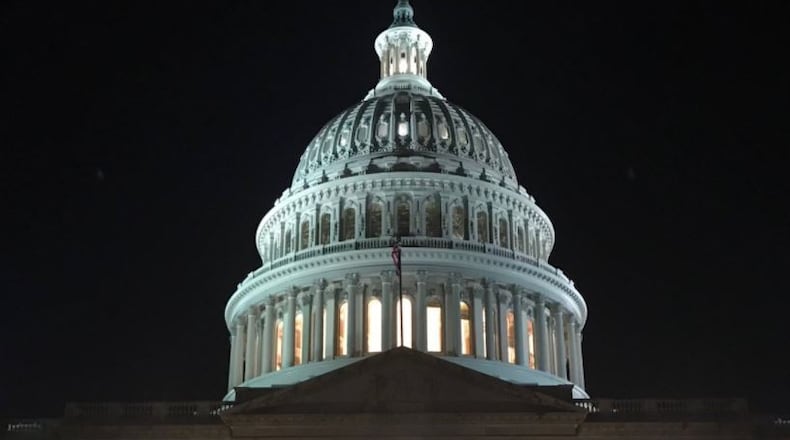While most of America was asleep, the federal government suffered its second shutdown in less than a month, as one Republican Senator prevented action in Congress to avoid a budget lapse at midnight, forcing the House and Senate to work through the night to restore funding, ensuring that government offices would be open on Friday.
"This is the dumbest shutdown ever," said Sen. Brian Schatz (D-HI).
"It's been an awful long night, and it didn't need to be," said Rep. Louise Slaughter (D-NY), as the House ended the shutdown just after 5:30 am, voting 240-186 to approve a two-year budget deal.
73 Democrats voted for the bill, while 67 House Republicans voted against it.
The overnight session was forced by Sen. Rand Paul (R-KY), who single-handedly blocked action in the Senate before a midnight funding deadline, as he criticized fellow Republicans for backing a two-year budget deal which features almost $300 billion in spending increases in 2018 and 2019.
“If you were against President Obama’s deficits, and now you’re for the Republican deficits, isn’t that the very definition of hypocrisy?” Paul asked on the Senate floor, as he predicted the deal would mean the return of $1 trillion yearly deficits.
“I don’t advocate for shutting the government down, but neither do I advocate for keeping it open, and borrowing a million dollars a minute,” Paul added.
Other Republicans agreed with Paul, refusing to back the largest spending addition since the Obama Stimulus in 2009.
"Our federal government is on an unsustainable fiscal path," said Sen. Pat Toomey (R-PA). "This spending spree makes it worse."
But those arguments failed, as a majority of both parties voted 71-28 at 1:52 am to approve the two-year budget deal unveiled on Wednesday, which included full funding for the military, and temporary funding for the rest of the federal government through March 23.
"Like any compromise, neither side got exactly what it wanted," said Sen. Sherrod Brown (D-OH).
Other Democrats registered their disappointment with the lack of provisions on DACA and illegal immigrant Dreamers.
"I voted against this legislation because Dreamers are not included in it," said Sen. Mazie Hirono (D-HI). "An overwhelming majority of the public supports legislation to protect Dreamers."
While the Senate will start a wide open debate on immigration next Monday, it's not clear when the House will work on DACA and the Dreamers, as Democrats repeatedly voiced their frustration.
"We ought to have a debate on this," said Rep. Jim McGovern (D-MA). "It really is frustrating, at this late hour, that we can't even get a committment from the Speaker of the House."
As for the details of the budget agreement approved early Friday, it would funnel $165 billion in new money over the next two years to the Pentagon, along with $131 billion in new spending for domestic programs.
There was also $89.3 billion for hurricane aid, to help deal with damage in Texas, Florida, Puerto Rico and the U.S. Virgin Islands.
"We got what we needed in hurricane disaster assistance, to help people rebuild their lives," said Sen. Bill Nelson (D-FL).
When combined with the almost $300 billion in new spending for defense and non-defense accounts, the hurricane aid brought the package to almost $400 billion.
For a lot of Republicans, that was not the right formula.
"The spending bill Congress is considering breaks just about every promise House Republicans have made over the last 8 years," said Rep. Raul Labrador (R-ID), who is leaving to run for Governor of Idaho.
"Do you oppose massive spending increases only when a Democrat is in the White House?" asked Rep. Justin Amash (R-MI), as he echoed Rand Paul's debate points in the Senate.
In debate on the House floor, most Democrats focused on the issue of DACA and the Dreamers, demanding a vote on legislation dealing with that immigration matter.
"All we want is a commitment," said Rep. Pete Aguilar (D-CA), as Democrats continued to press House Speaker Paul Ryan for a concrete pledge on a DACA vote.
About the Author
The Latest
Featured



